MBA502 Assessment 1: Emotional Intelligence and Diversity Essay
VerifiedAdded on 2023/01/19
|6
|1645
|40
Essay
AI Summary
This essay provides a comprehensive analysis of the student's emotional and cultural intelligence, and their understanding of diversity. The assignment involved self-assessment using the Global Emotional Intelligence Test (GEIT) and Daniel Goleman’s EQ Instrument, followed by assessments from two friends. The student then employed the Johari window model to analyze the results, identifying strengths and weaknesses in self-awareness, self-management, social awareness, and relationship management. The essay further explores the concept of global citizenship, highlighting the importance of leadership skills and community awareness in a globalized world. The student reflects on their personality traits, self-esteem, and the need for integrating individual and collective consciousness. The essay concludes by emphasizing the importance of leveraging strengths to overcome weaknesses and embrace opportunities for personal and professional growth in an increasingly interconnected world. The essay showcases the student’s ability to self-reflect and apply theoretical concepts to personal experiences.
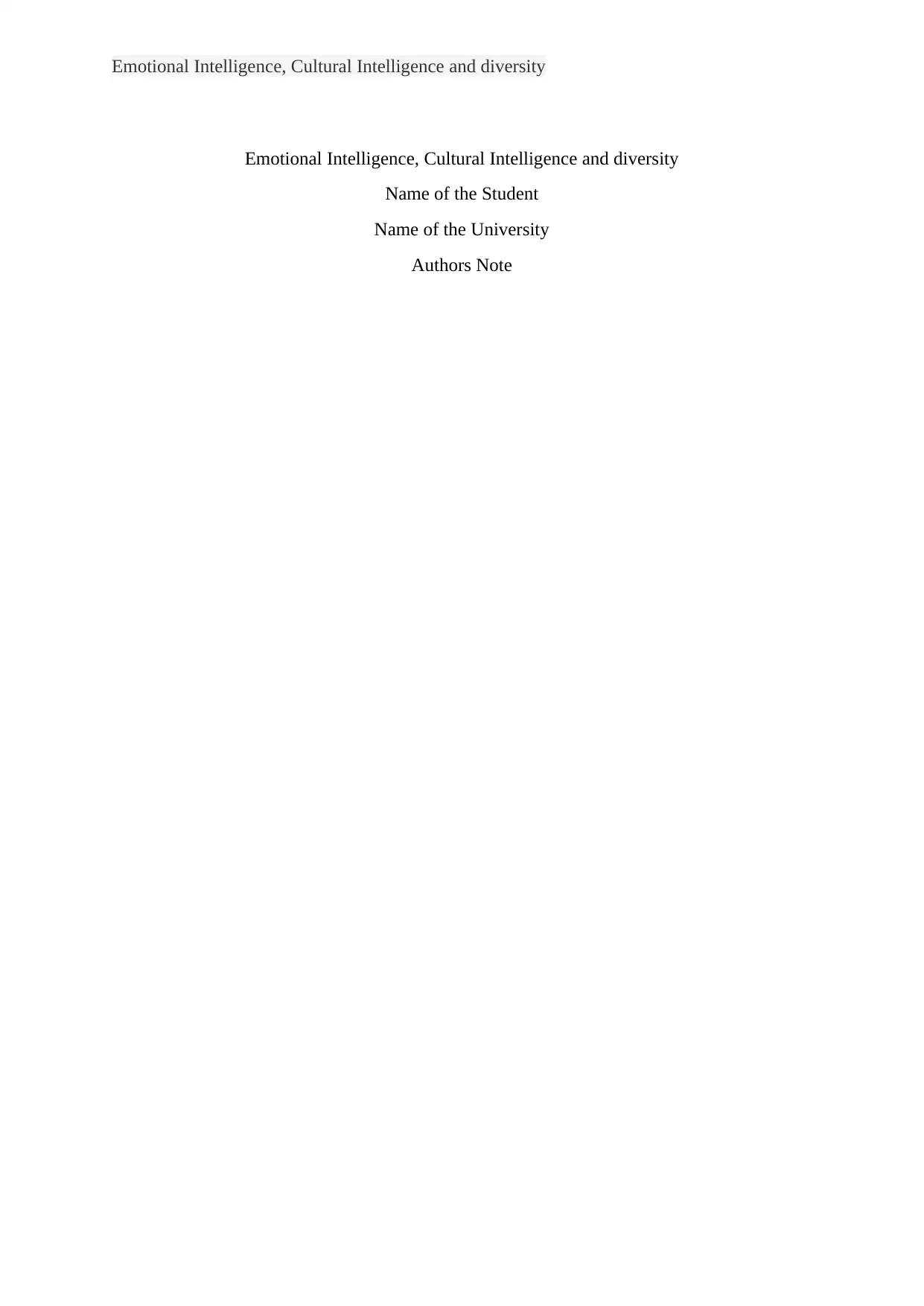
Emotional Intelligence, Cultural Intelligence and diversity
Emotional Intelligence, Cultural Intelligence and diversity
Name of the Student
Name of the University
Authors Note
Emotional Intelligence, Cultural Intelligence and diversity
Name of the Student
Name of the University
Authors Note
Paraphrase This Document
Need a fresh take? Get an instant paraphrase of this document with our AI Paraphraser
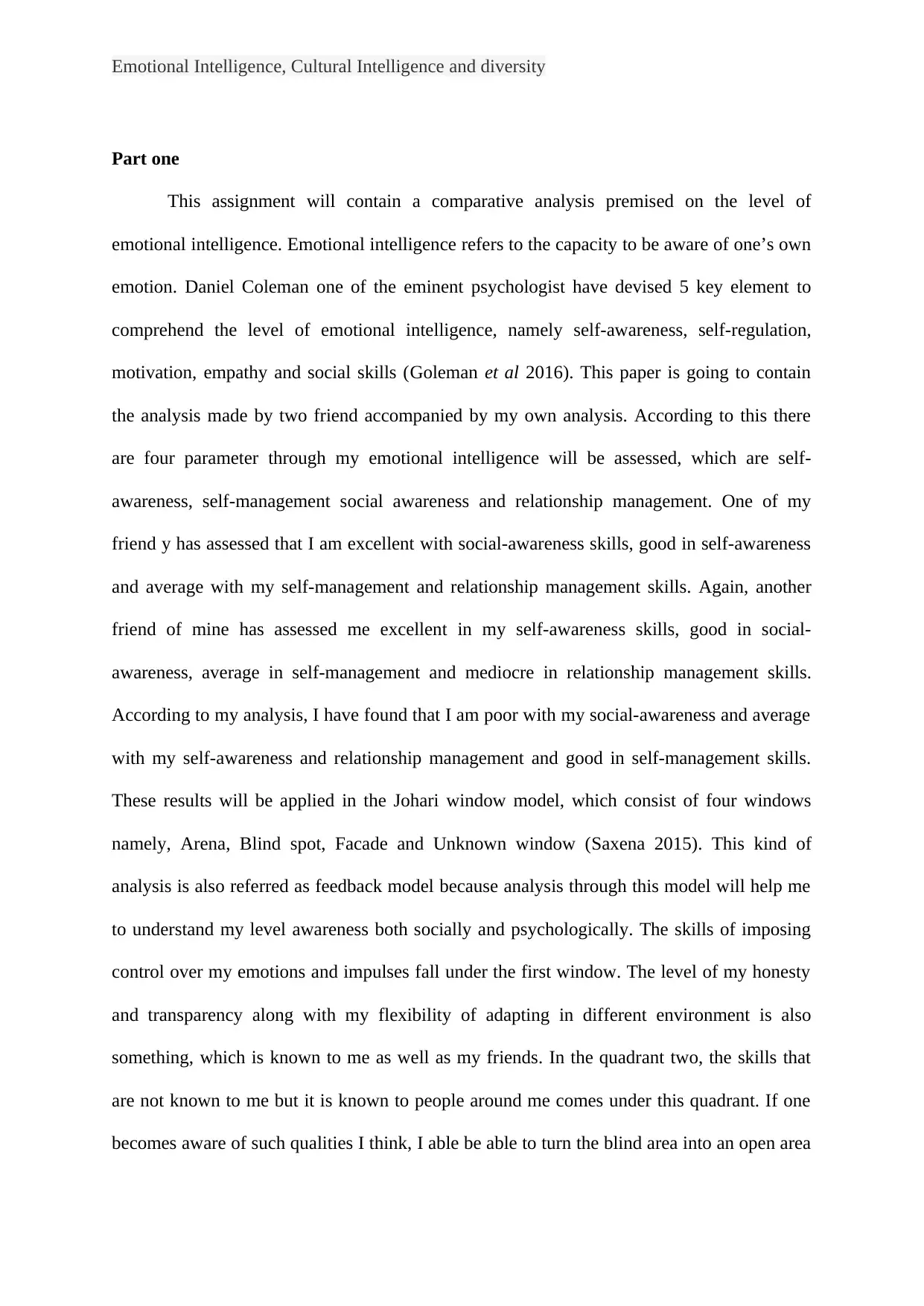
Emotional Intelligence, Cultural Intelligence and diversity
Part one
This assignment will contain a comparative analysis premised on the level of
emotional intelligence. Emotional intelligence refers to the capacity to be aware of one’s own
emotion. Daniel Coleman one of the eminent psychologist have devised 5 key element to
comprehend the level of emotional intelligence, namely self-awareness, self-regulation,
motivation, empathy and social skills (Goleman et al 2016). This paper is going to contain
the analysis made by two friend accompanied by my own analysis. According to this there
are four parameter through my emotional intelligence will be assessed, which are self-
awareness, self-management social awareness and relationship management. One of my
friend y has assessed that I am excellent with social-awareness skills, good in self-awareness
and average with my self-management and relationship management skills. Again, another
friend of mine has assessed me excellent in my self-awareness skills, good in social-
awareness, average in self-management and mediocre in relationship management skills.
According to my analysis, I have found that I am poor with my social-awareness and average
with my self-awareness and relationship management and good in self-management skills.
These results will be applied in the Johari window model, which consist of four windows
namely, Arena, Blind spot, Facade and Unknown window (Saxena 2015). This kind of
analysis is also referred as feedback model because analysis through this model will help me
to understand my level awareness both socially and psychologically. The skills of imposing
control over my emotions and impulses fall under the first window. The level of my honesty
and transparency along with my flexibility of adapting in different environment is also
something, which is known to me as well as my friends. In the quadrant two, the skills that
are not known to me but it is known to people around me comes under this quadrant. If one
becomes aware of such qualities I think, I able be able to turn the blind area into an open area
Part one
This assignment will contain a comparative analysis premised on the level of
emotional intelligence. Emotional intelligence refers to the capacity to be aware of one’s own
emotion. Daniel Coleman one of the eminent psychologist have devised 5 key element to
comprehend the level of emotional intelligence, namely self-awareness, self-regulation,
motivation, empathy and social skills (Goleman et al 2016). This paper is going to contain
the analysis made by two friend accompanied by my own analysis. According to this there
are four parameter through my emotional intelligence will be assessed, which are self-
awareness, self-management social awareness and relationship management. One of my
friend y has assessed that I am excellent with social-awareness skills, good in self-awareness
and average with my self-management and relationship management skills. Again, another
friend of mine has assessed me excellent in my self-awareness skills, good in social-
awareness, average in self-management and mediocre in relationship management skills.
According to my analysis, I have found that I am poor with my social-awareness and average
with my self-awareness and relationship management and good in self-management skills.
These results will be applied in the Johari window model, which consist of four windows
namely, Arena, Blind spot, Facade and Unknown window (Saxena 2015). This kind of
analysis is also referred as feedback model because analysis through this model will help me
to understand my level awareness both socially and psychologically. The skills of imposing
control over my emotions and impulses fall under the first window. The level of my honesty
and transparency along with my flexibility of adapting in different environment is also
something, which is known to me as well as my friends. In the quadrant two, the skills that
are not known to me but it is known to people around me comes under this quadrant. If one
becomes aware of such qualities I think, I able be able to turn the blind area into an open area
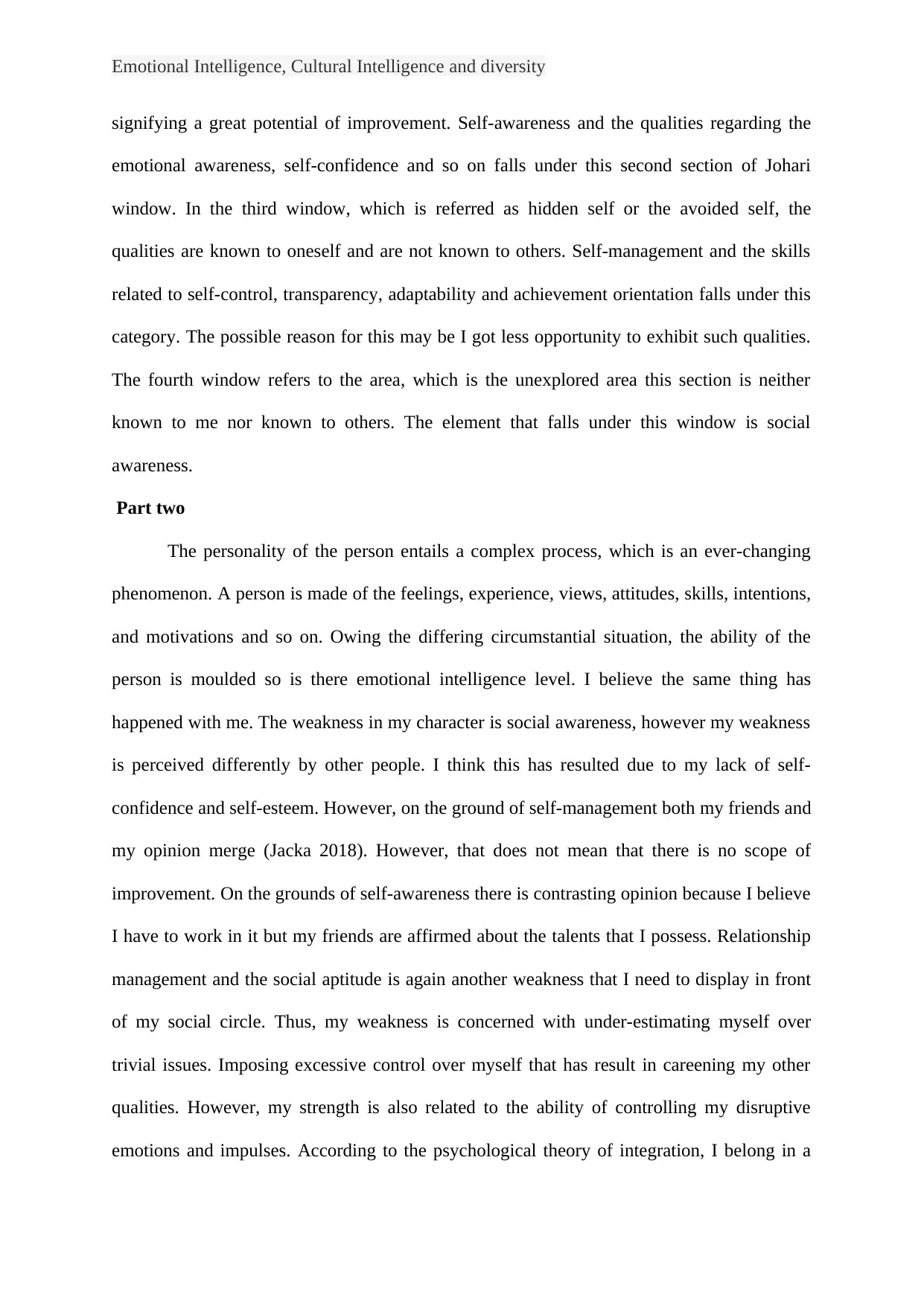
Emotional Intelligence, Cultural Intelligence and diversity
signifying a great potential of improvement. Self-awareness and the qualities regarding the
emotional awareness, self-confidence and so on falls under this second section of Johari
window. In the third window, which is referred as hidden self or the avoided self, the
qualities are known to oneself and are not known to others. Self-management and the skills
related to self-control, transparency, adaptability and achievement orientation falls under this
category. The possible reason for this may be I got less opportunity to exhibit such qualities.
The fourth window refers to the area, which is the unexplored area this section is neither
known to me nor known to others. The element that falls under this window is social
awareness.
Part two
The personality of the person entails a complex process, which is an ever-changing
phenomenon. A person is made of the feelings, experience, views, attitudes, skills, intentions,
and motivations and so on. Owing the differing circumstantial situation, the ability of the
person is moulded so is there emotional intelligence level. I believe the same thing has
happened with me. The weakness in my character is social awareness, however my weakness
is perceived differently by other people. I think this has resulted due to my lack of self-
confidence and self-esteem. However, on the ground of self-management both my friends and
my opinion merge (Jacka 2018). However, that does not mean that there is no scope of
improvement. On the grounds of self-awareness there is contrasting opinion because I believe
I have to work in it but my friends are affirmed about the talents that I possess. Relationship
management and the social aptitude is again another weakness that I need to display in front
of my social circle. Thus, my weakness is concerned with under-estimating myself over
trivial issues. Imposing excessive control over myself that has result in careening my other
qualities. However, my strength is also related to the ability of controlling my disruptive
emotions and impulses. According to the psychological theory of integration, I belong in a
signifying a great potential of improvement. Self-awareness and the qualities regarding the
emotional awareness, self-confidence and so on falls under this second section of Johari
window. In the third window, which is referred as hidden self or the avoided self, the
qualities are known to oneself and are not known to others. Self-management and the skills
related to self-control, transparency, adaptability and achievement orientation falls under this
category. The possible reason for this may be I got less opportunity to exhibit such qualities.
The fourth window refers to the area, which is the unexplored area this section is neither
known to me nor known to others. The element that falls under this window is social
awareness.
Part two
The personality of the person entails a complex process, which is an ever-changing
phenomenon. A person is made of the feelings, experience, views, attitudes, skills, intentions,
and motivations and so on. Owing the differing circumstantial situation, the ability of the
person is moulded so is there emotional intelligence level. I believe the same thing has
happened with me. The weakness in my character is social awareness, however my weakness
is perceived differently by other people. I think this has resulted due to my lack of self-
confidence and self-esteem. However, on the ground of self-management both my friends and
my opinion merge (Jacka 2018). However, that does not mean that there is no scope of
improvement. On the grounds of self-awareness there is contrasting opinion because I believe
I have to work in it but my friends are affirmed about the talents that I possess. Relationship
management and the social aptitude is again another weakness that I need to display in front
of my social circle. Thus, my weakness is concerned with under-estimating myself over
trivial issues. Imposing excessive control over myself that has result in careening my other
qualities. However, my strength is also related to the ability of controlling my disruptive
emotions and impulses. According to the psychological theory of integration, I belong in a
⊘ This is a preview!⊘
Do you want full access?
Subscribe today to unlock all pages.

Trusted by 1+ million students worldwide
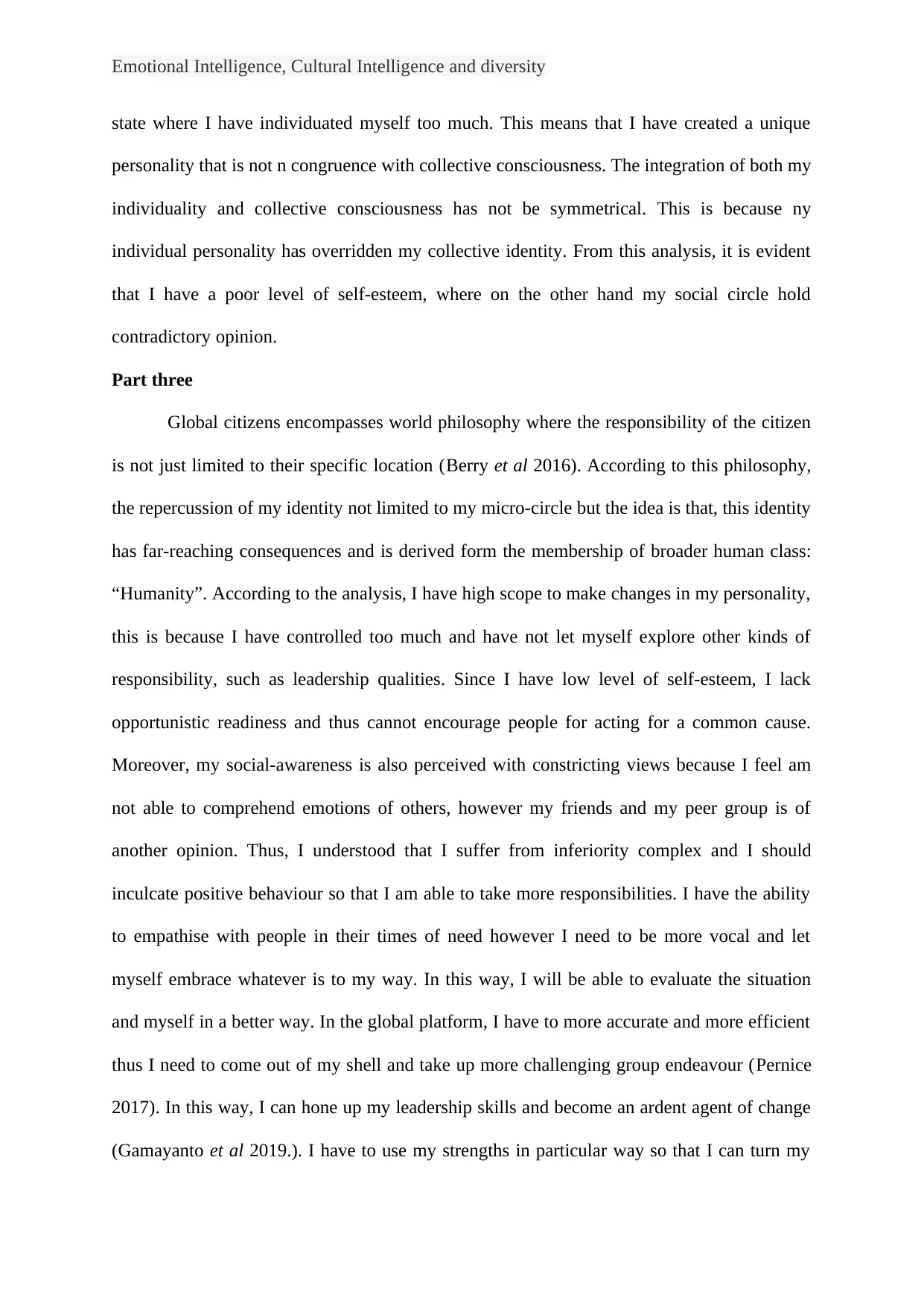
Emotional Intelligence, Cultural Intelligence and diversity
state where I have individuated myself too much. This means that I have created a unique
personality that is not n congruence with collective consciousness. The integration of both my
individuality and collective consciousness has not be symmetrical. This is because ny
individual personality has overridden my collective identity. From this analysis, it is evident
that I have a poor level of self-esteem, where on the other hand my social circle hold
contradictory opinion.
Part three
Global citizens encompasses world philosophy where the responsibility of the citizen
is not just limited to their specific location (Berry et al 2016). According to this philosophy,
the repercussion of my identity not limited to my micro-circle but the idea is that, this identity
has far-reaching consequences and is derived form the membership of broader human class:
“Humanity”. According to the analysis, I have high scope to make changes in my personality,
this is because I have controlled too much and have not let myself explore other kinds of
responsibility, such as leadership qualities. Since I have low level of self-esteem, I lack
opportunistic readiness and thus cannot encourage people for acting for a common cause.
Moreover, my social-awareness is also perceived with constricting views because I feel am
not able to comprehend emotions of others, however my friends and my peer group is of
another opinion. Thus, I understood that I suffer from inferiority complex and I should
inculcate positive behaviour so that I am able to take more responsibilities. I have the ability
to empathise with people in their times of need however I need to be more vocal and let
myself embrace whatever is to my way. In this way, I will be able to evaluate the situation
and myself in a better way. In the global platform, I have to more accurate and more efficient
thus I need to come out of my shell and take up more challenging group endeavour (Pernice
2017). In this way, I can hone up my leadership skills and become an ardent agent of change
(Gamayanto et al 2019.). I have to use my strengths in particular way so that I can turn my
state where I have individuated myself too much. This means that I have created a unique
personality that is not n congruence with collective consciousness. The integration of both my
individuality and collective consciousness has not be symmetrical. This is because ny
individual personality has overridden my collective identity. From this analysis, it is evident
that I have a poor level of self-esteem, where on the other hand my social circle hold
contradictory opinion.
Part three
Global citizens encompasses world philosophy where the responsibility of the citizen
is not just limited to their specific location (Berry et al 2016). According to this philosophy,
the repercussion of my identity not limited to my micro-circle but the idea is that, this identity
has far-reaching consequences and is derived form the membership of broader human class:
“Humanity”. According to the analysis, I have high scope to make changes in my personality,
this is because I have controlled too much and have not let myself explore other kinds of
responsibility, such as leadership qualities. Since I have low level of self-esteem, I lack
opportunistic readiness and thus cannot encourage people for acting for a common cause.
Moreover, my social-awareness is also perceived with constricting views because I feel am
not able to comprehend emotions of others, however my friends and my peer group is of
another opinion. Thus, I understood that I suffer from inferiority complex and I should
inculcate positive behaviour so that I am able to take more responsibilities. I have the ability
to empathise with people in their times of need however I need to be more vocal and let
myself embrace whatever is to my way. In this way, I will be able to evaluate the situation
and myself in a better way. In the global platform, I have to more accurate and more efficient
thus I need to come out of my shell and take up more challenging group endeavour (Pernice
2017). In this way, I can hone up my leadership skills and become an ardent agent of change
(Gamayanto et al 2019.). I have to use my strengths in particular way so that I can turn my
Paraphrase This Document
Need a fresh take? Get an instant paraphrase of this document with our AI Paraphraser
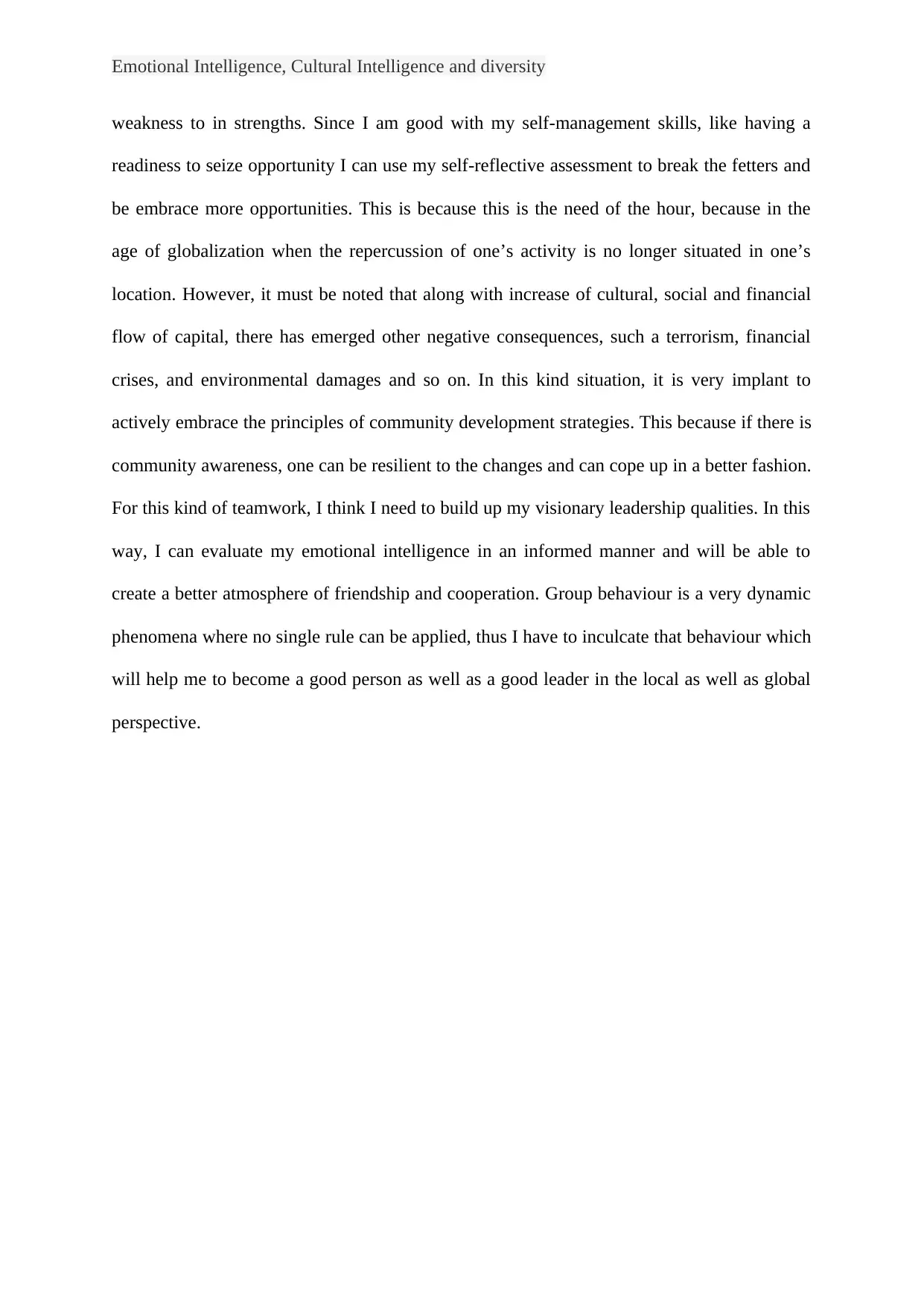
Emotional Intelligence, Cultural Intelligence and diversity
weakness to in strengths. Since I am good with my self-management skills, like having a
readiness to seize opportunity I can use my self-reflective assessment to break the fetters and
be embrace more opportunities. This is because this is the need of the hour, because in the
age of globalization when the repercussion of one’s activity is no longer situated in one’s
location. However, it must be noted that along with increase of cultural, social and financial
flow of capital, there has emerged other negative consequences, such a terrorism, financial
crises, and environmental damages and so on. In this kind situation, it is very implant to
actively embrace the principles of community development strategies. This because if there is
community awareness, one can be resilient to the changes and can cope up in a better fashion.
For this kind of teamwork, I think I need to build up my visionary leadership qualities. In this
way, I can evaluate my emotional intelligence in an informed manner and will be able to
create a better atmosphere of friendship and cooperation. Group behaviour is a very dynamic
phenomena where no single rule can be applied, thus I have to inculcate that behaviour which
will help me to become a good person as well as a good leader in the local as well as global
perspective.
weakness to in strengths. Since I am good with my self-management skills, like having a
readiness to seize opportunity I can use my self-reflective assessment to break the fetters and
be embrace more opportunities. This is because this is the need of the hour, because in the
age of globalization when the repercussion of one’s activity is no longer situated in one’s
location. However, it must be noted that along with increase of cultural, social and financial
flow of capital, there has emerged other negative consequences, such a terrorism, financial
crises, and environmental damages and so on. In this kind situation, it is very implant to
actively embrace the principles of community development strategies. This because if there is
community awareness, one can be resilient to the changes and can cope up in a better fashion.
For this kind of teamwork, I think I need to build up my visionary leadership qualities. In this
way, I can evaluate my emotional intelligence in an informed manner and will be able to
create a better atmosphere of friendship and cooperation. Group behaviour is a very dynamic
phenomena where no single rule can be applied, thus I have to inculcate that behaviour which
will help me to become a good person as well as a good leader in the local as well as global
perspective.
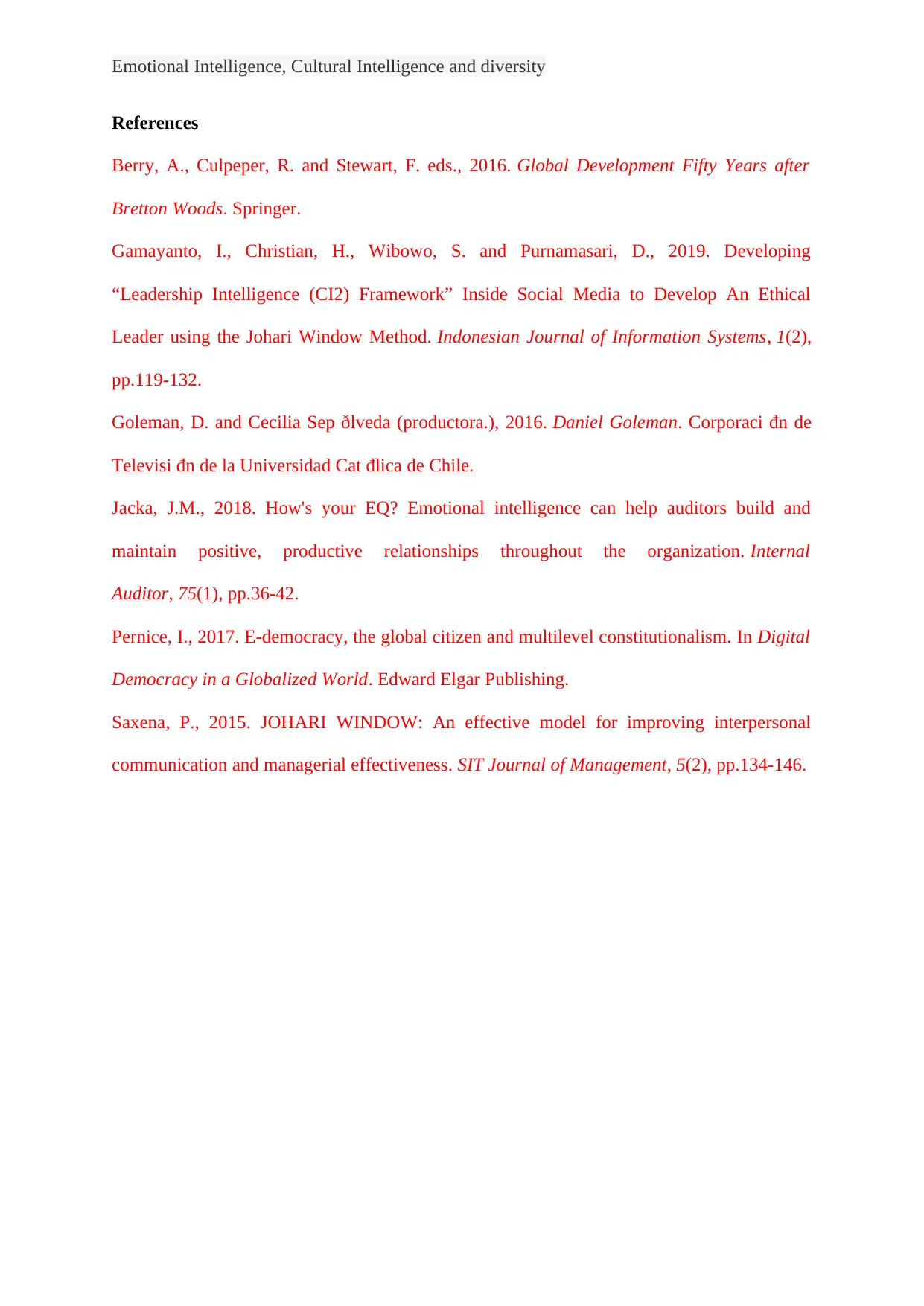
Emotional Intelligence, Cultural Intelligence and diversity
References
Berry, A., Culpeper, R. and Stewart, F. eds., 2016. Global Development Fifty Years after
Bretton Woods. Springer.
Gamayanto, I., Christian, H., Wibowo, S. and Purnamasari, D., 2019. Developing
“Leadership Intelligence (CI2) Framework” Inside Social Media to Develop An Ethical
Leader using the Johari Window Method. Indonesian Journal of Information Systems, 1(2),
pp.119-132.
Goleman, D. and Cecilia Sep ðlveda (productora.), 2016. Daniel Goleman. Corporaci đn de
Televisi đn de la Universidad Cat đlica de Chile.
Jacka, J.M., 2018. How's your EQ? Emotional intelligence can help auditors build and
maintain positive, productive relationships throughout the organization. Internal
Auditor, 75(1), pp.36-42.
Pernice, I., 2017. E-democracy, the global citizen and multilevel constitutionalism. In Digital
Democracy in a Globalized World. Edward Elgar Publishing.
Saxena, P., 2015. JOHARI WINDOW: An effective model for improving interpersonal
communication and managerial effectiveness. SIT Journal of Management, 5(2), pp.134-146.
References
Berry, A., Culpeper, R. and Stewart, F. eds., 2016. Global Development Fifty Years after
Bretton Woods. Springer.
Gamayanto, I., Christian, H., Wibowo, S. and Purnamasari, D., 2019. Developing
“Leadership Intelligence (CI2) Framework” Inside Social Media to Develop An Ethical
Leader using the Johari Window Method. Indonesian Journal of Information Systems, 1(2),
pp.119-132.
Goleman, D. and Cecilia Sep ðlveda (productora.), 2016. Daniel Goleman. Corporaci đn de
Televisi đn de la Universidad Cat đlica de Chile.
Jacka, J.M., 2018. How's your EQ? Emotional intelligence can help auditors build and
maintain positive, productive relationships throughout the organization. Internal
Auditor, 75(1), pp.36-42.
Pernice, I., 2017. E-democracy, the global citizen and multilevel constitutionalism. In Digital
Democracy in a Globalized World. Edward Elgar Publishing.
Saxena, P., 2015. JOHARI WINDOW: An effective model for improving interpersonal
communication and managerial effectiveness. SIT Journal of Management, 5(2), pp.134-146.
⊘ This is a preview!⊘
Do you want full access?
Subscribe today to unlock all pages.

Trusted by 1+ million students worldwide
1 out of 6
Related Documents
Your All-in-One AI-Powered Toolkit for Academic Success.
+13062052269
info@desklib.com
Available 24*7 on WhatsApp / Email
![[object Object]](/_next/static/media/star-bottom.7253800d.svg)
Unlock your academic potential
Copyright © 2020–2026 A2Z Services. All Rights Reserved. Developed and managed by ZUCOL.





